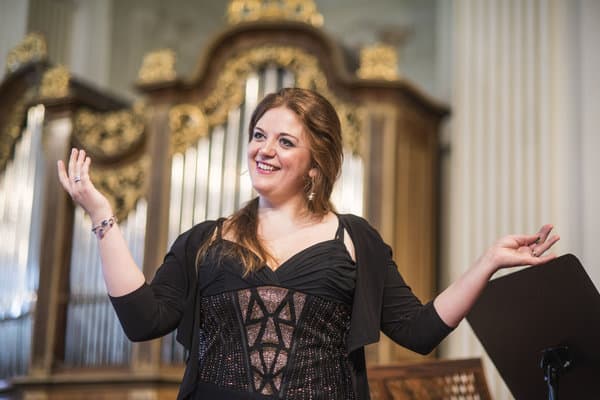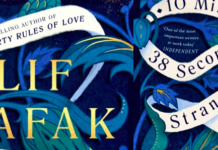Among the impressive list of twenty-six concerts, the evening of “Turquerie: The Ottoman Magic” was the evening that I had been looking forward to the most: Not only was the “West meets East” program very intriguing, but it also featured two great names of much excitement: the not only talented but extremely amicable soprano Francesca Lombardi, and Valer Barna Sabadus, one of the few counter-tenors I have ever encountered in concert – and one with an amazing voice at that.
“Turquerie” consisted of two-hours of music, based on a theme that featured European composers so-inspired by the Ottoman culture that they had carried it into their compositions. For example, the opening piece was “Ballo Grande” from the Ballo di Donne Turche (Ballroom of the Turkish Women) of Marco da Gagliano. It was followed by Ballo d’Eunuche (the Dance of the Eunuchs) from Opera La Dori of Antonio Cesti. Counter-tenor Valer Barna-Sabadus sang from “La mia Turca” (My Turkish girl) of Cladio Monteverdi, while Soprano Lombardi sang works such as “Canto Fatima” (The Song of Fatima) and “Seha zülfün” – a piece dating back to the 17th century and a love story between a Venetian girl and Turkish Ali who falls captive to pirates.
The director of this unique evening was Mehmet Yeşilçay, who was also on the oud and baroque guitar. The Baroque orchestra, the Pera Ensemble, featured two baroque violins, a viola da gamba, a violone, baroque guitar, a unique blend of percussions, the harpischord, and the Turkish instruments of kanun and kemençe.

Valer Barna Sabadus was the first vocal soloist, and he sang Si dolce è’l Tormento from La Mia Turca of Claudio Monteverdi. For the non-opera savy: A counter-tenor is a male singing voice with a vocal range equal that of the female contralto or mezzo-soprano. And it is a voice to impress: In La Mia Turca, Sabadus sang, laughed, clucked and sang in a voice phenomenal to see coming from a male. Later, in Guilio Caccini’s Amarilli, his voice soared through the air, as flamboyant as the wind beneath the wings of a bird. Ohimè ch’io cado (Alas for me, I fall) was among the most intriguing pieces of his singing, with pizzicato’s coming from the viola de gamba in jazz style, and a singing style that sang with the soaring impeccability of opera but the chillin’ coolness of rap.
Francesca Lombardi Mazzulli came in next, with Tarquinio Merula’s Usurpator Tiranor. Her voice echoed throughout the acoustic St. Irene Church, and added aura, delicacy, and beauty to the piece. Subtle touches to the percussion added suspense to the piece, the cellos provided continuity, and the viola da gamba, the ney, and the harpischord made up the composition. In Seha zülfün, she sang in Turkish a centuries old tale involving Venice, pirates, and a love story of odds during Ottoman times. And her voice was enchantingly, entrancingly beautiful. I could not catch the words to Canto Fatima, but no matter what may have been her story, the feelings it evoked were beautiful. and Lombardi sang it in a voice that wowed the audience. Lombardi also drew attention with her persona: She had the voice of a primadonna but the persona of the most gentle, amicable, and witty person in the world. She was at peace with the world and you could tell that she enjoyed the music and loved what she did. You ended up not only being impressed with her voice, but being drawn into her amicable persona.

Sabadus and Lombardi also joined in several duets, and it was only right that the closing piece Dalla porta D’Oriente (From the Gates of the Orient) of Giulio Caccino also brought the two phenomenal voices together. Lombardi and Sabadus sang in duet of spirit, joy, and vibrancy and provided the perfect ending to an impeccable evening.
….
Or so I had assumed. But, the night was young and had a lot more waiting for me. You see, I had attended another Lombardi performance some months ago in Istanbul. I had stepped backstage hoping for an autograph, and walked out with much more: the promise of an upcoming performance in June 2014, and “instructions” to let her know of my attendance. Well, this had been the promised performance. And, Lombardi had indeed remembered me when I had emailed her a few days earlier about my excitement about getting to witness her performance again.
So, I decided to give it a shot and try to catch her backstage to say “Hello” again. Lombardi greeted me as if I was the star, and she the humble fan. And, half an hour later, I was to find myself in a cafe adjacent to their hotel off the Topkapi Palace, seated among Lombardi, Sabadus, and the entire Pera Ensemble, in conversation with all. The amazing superstars of the voice, Lombardi and Sabadus, and the wizards of Baroque, the Pera Ensemble. Around 2 a.m., it became time to part, and they thanked me for my time with them. How much more down-to-earth can one get? I said that it was the other way around, and that I was grateful for their amicability and hospitality. I wanted to do cartwheels of joy as I parted the hotel. What an incredible way to finish off an already amazing performance…
Melis Kanik is a contributor for Yabangee.









